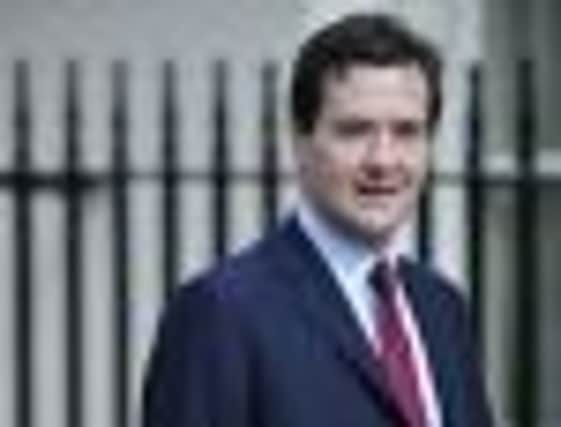UK economy: Pressure on George Osborne as Britain trails the eurozone


Growth figures released yesterday showed the UK’s main European competitors were weathering the economic storm more effectively, despite the eurozone standing on the brink of a double-dip recession.
The 17-nation economy, which is the UK’s biggest trading partner, suffered a 0.2 per cent decline in GDP between April and June.
Advertisement
Hide AdAdvertisement
Hide AdThe shrinking eurozone growth, however, was not as severe as the minus 0.7 per cent contraction experienced by the UK over the same period.
It was only the solid 0.3 per cent growth recorded by Germany, one of Europe’s most resilient economies, that saved the eurozone from plunging into recession.
Amid another welter of depressing statistics, France was the only other country not to show negative growth. France teetered on a zero Gross Domestic Product for the third quarter in a row – a pattern that was hardly encouraging ,but was still comfortably ahead of the UK.
The UK’s poor performance relative to Germany and France led to the SNP renewing its calls for the Chancellor to change his debt strategy by stimulating the economy.
Yesterday, First Minister Alex Salmond said: “It is clear that the UK’s government’s austerity agenda, and failure to heed calls for direct investment in construction and infrastructure, is hampering progress. Westminster urgently needs to implement a policy of capital investment – as a whole range of economic commentators are calling for – and the Chancellor must act now.”
Mr Salmond added: “The Scottish Government has consistently argued for capital investment to boost, not just construction, but also the wider economy.”
SNP Treasury spokesman, Stewart Hosie, MP, said: “These growth figures make grim reading and should wake the Chancellor from his summer slumber. While there are real concerns about economic contraction across Europe, the figures expose the myth that the eurozone is to blame for the recession.”
Economic analysts said the figures covering the first two quarters of 2012 and compiled by eurostat, the statistical office of the European Union, could become worse over the coming months.
Advertisement
Hide AdAdvertisement
Hide AdING Bank analyst Martin van Vliet said: “Leading indicators suggest there is a fair chance that the eurozone economy might contract further in the third quarter, and hence enter a technical recession.”
A breakdown of the statistics revealed severe declines in output, with Belgium suffering a 0.6 per cent decline in GDP, Italy contracting by 0.7 per cent and Portugal’s economy shrinking 1.2 per cent.
The Netherlands and Austria both saw growth of 0.2 per cent, while the whole of Europe, including non-euro countries, declined by 0.2 per cent.
The figures compare with 0.4 per cent growth in the United States and 0.3 per cent growth in Japan.
The better-than-expected performance from Germany and France saw the single currency strengthen against most major currencies.
Mr van Vliet said: “The country breakdown tells a tale of two regions. Northern eurozone economies are still defying technical recession, while southern Europe remains mired in recession.”
The UK found itself in the longest double-dip recession since the 1950s when official figures recently revealed that the economy had contracted for the third consecutive quarter between April and June.
The biggest quarterly decline in three years was driven by a dire construction and manufacturing performance, as well as one-off factors, such as the additional bank holiday for the Diamond Jubilee.
Advertisement
Hide AdAdvertisement
Hide AdMeanwhile, the UK’s trade deficit widened to a record level in June as exports plunged to the eurozone and across the world.
The goods and services deficit – the gap between imports and exports – rose to £4.3 billion from £2.7bn in May, the highest level since comparable records began in 1997, as exports of traded goods to EU countries fell by 7.2 per cent month on month.
Jonathan Loynes, the chief European economist at Capital Economics, said: “The big picture is that the economic growth required to bring the region’s debt crisis to an end is still nowhere in sight.”
The eurozone is grappling with sky-high debt levels and record unemployment. Compared with the year before, its economy is 0.4 per cent smaller.
The growth of 0.3 per cent recorded by the German economy, the largest in Europe, was down on the quarterly rate of 0.5 per cent recorded in the first quarter. Nevertheless, the slight growth experienced was a little more than expected – most economists thought Germany would grow by 0.2 per cent.
The other 16 countries that use the euro are Germany’s biggest export market and six of them are in recession.
The US is also coming off the boil, with growth in the second quarter down compared with the previous three months at 0.4 per cent, according to Eurostat. Slower economic growth is also making it harder for governments and central banks to control the debt crisis in Europe.
Shrinking economies make it more difficult to get the public finances into shape. Lower output dents tax revenues, while forcing up the cost of social benefits.